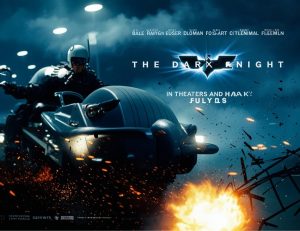“The Dark Knight” (2008) is the second film in Christopher Nolan’s The Dark Knight Trilogy and a sequel to Batman Begins (2005). It is widely regarded as one of the greatest superhero films ever made and a critical achievement in the genre. Here’s a breakdown of key aspects of the film:
Plot Summary
The film follows Bruce Wayne (Christian Bale) as he continues his crusade as Batman, trying to rid Gotham City of its criminal underworld. He faces a new, chaotic villain—The Joker (Heath Ledger), a sadistic anarchist with no clear motive other than to create havoc and disrupt Gotham’s order. The Joker seeks to show that anyone, including the seemingly incorruptible Batman, can be turned to evil, challenging Batman’s sense of justice.
As Batman grapples with the moral consequences of his actions, he also has to deal with the rise of Harvey Dent (Aaron Eckhart), the district attorney, who becomes the vengeful vigilante Two-Face after a tragic turn of events.

Themes
- Chaos vs. Order: The Joker represents chaos and randomness, in stark contrast to Batman’s quest for order and justice. This central theme explores the balance between good and evil, as well as the thin line between hero and villain.
- Moral Dilemmas: The film explores difficult moral choices. Batman must decide how far he’s willing to go to stop crime without losing his own humanity.
- Duality: Both Batman and Harvey Dent struggle with dual identities. Batman hides behind the mask of a hero, while Dent, once Gotham’s “White Knight,” becomes consumed by vengeance.
Key Characters
- Bruce Wayne/Batman (Christian Bale): The billionaire philanthropist who secretly fights crime as the vigilante Batman. In this film, he’s at a crossroads, trying to stop crime while questioning his own methods.
- The Joker (Heath Ledger): The film’s primary antagonist, a master criminal with no agenda other than to create anarchy. Ledger’s portrayal of the character was iconic and earned him a posthumous Academy Award for Best Supporting Actor.
- Harvey Dent/Two-Face (Aaron Eckhart): Gotham’s district attorney who begins as a symbol of hope but becomes a tragic figure after a brutal accident. His transformation into Two-Face highlights the theme of duality and vengeance.
- Rachel Dawes (Maggie Gyllenhaal): Bruce’s childhood friend and love interest, who plays a pivotal role in the emotional conflict between Bruce and Harvey.
- Alfred Pennyworth (Michael Caine): Bruce’s loyal butler and father figure, who offers guidance and wisdom.
- Lucius Fox (Morgan Freeman): The head of Wayne Enterprises, who helps Bruce with his technological needs in his crime-fighting efforts.
- James Gordon (Gary Oldman): Gotham’s police commissioner who works alongside Batman to stop the growing crime wave.
Production
- Directed by Christopher Nolan: Nolan is praised for bringing a grounded, realistic approach to superhero storytelling, which has been a hallmark of his films. His vision for Batman as a complex, psychologically driven character is central to the film’s success.
- Heath Ledger’s Performance: Ledger’s portrayal of the Joker was groundbreaking, redefining the character as a symbol of pure chaos. His performance received universal acclaim and is often considered one of the best in film history. The Joker became an unforgettable cultural icon.
- Cinematography & IMAX: The film used IMAX cameras for certain sequences, enhancing the visual experience and creating a more immersive feel. Wally Pfister’s cinematography was highly praised for its innovative and dynamic style.
- Soundtrack: The film’s music, composed by Hans Zimmer and James Newton Howard, complements its dark tone and tension, using intense, minimalist compositions.
Cultural Impact
“The Dark Knight” set a new standard for superhero films, blending action with deep philosophical questions about morality, justice, and the human psyche. Its impact is seen in the subsequent rise of darker, more grounded superhero films in Hollywood.
It also inspired a broader conversation about the potential for comic book movies to be both critically acclaimed and commercially successful. The film’s success opened the door for other superhero films to be taken more seriously as cinema, rather than just as entertainment.
Awards and Recognition
- Academy Awards: Heath Ledger won the Academy Award for Best Supporting Actor posthumously. The film was also nominated for seven Oscars and won two (Best Sound Editing and Best Supporting Actor).
- Box Office: The Dark Knight grossed over $1 billion worldwide, making it one of the highest-grossing films of its time and the first comic book movie to reach that milestone.
Legacy
The film’s success, along with the entire trilogy, led to a broader appreciation for the superhero genre, and The Dark Knight is often considered a masterpiece of modern cinema. It continues to be referenced in discussions about the best films of the 21st century.
In conclusion, The Dark Knight (2008) is a deeply influential film, blending high-octane action with profound ethical dilemmas and offering a complex, multifaceted story that resonates with audiences beyond the superhero genre.


